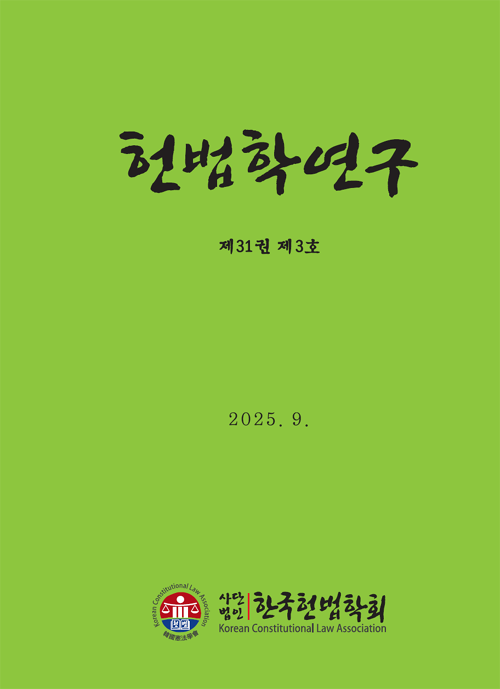- 영문명
- Constitutional Challenges in the Era of Digital Transformation(DX) and Future Agriculture
- 발행기관
- 한국헌법학회
- 저자명
- 김일우(Il Woo Kim)
- 간행물 정보
- 『헌법학연구』第31卷 第3號, 209~247쪽, 전체 39쪽
- 주제분류
- 법학 > 법학
- 파일형태
- 발행일자
- 2025.09.30
7,480원
구매일시로부터 72시간 이내에 다운로드 가능합니다.
이 학술논문 정보는 (주)교보문고와 각 발행기관 사이에 저작물 이용 계약이 체결된 것으로, 교보문고를 통해 제공되고 있습니다.

국문 초록
디지털사회전환(DX)에서 디지털농업은 식량위기 대응과 농업인의 삶의 질 제고 등 차원에서 그 의미와 가치가 새롭게 부상하고 있다. 특히 AI, 사물인터넷, 빅데이터 등 디지털기술의 발전에 힘입어, 디지털농업은 지속가능한 농업의 발전을 견인하는 데 보탬이 될 것으로 전망된다.
이러한 배경에서 정부는 2025년 ‘국가 AI대전환 종합계획’을 통하여 디지털 기술을 활용한 농업산업의 혁신성장을 도모하고, 농업데이터 기반 의사결정 지원 및 자율주행 농기계 보급 등으로 농업의 디지털전환(DX)을 본격적으로 추진하고 있다. 디지털기술을 활용한 농업은 식량안보를 강화하는 동시에 농촌 경제를 활성화하고 농업산업의 재도약 등 새로운 변화를 촉진할 것으로 기대된다. 주요 국가들은 농업산업에 디지털 기술을 적극적으로 지원하고 있으며, 이를 통해 농업인들의 농업 생산성 향상뿐만 아니라 삶의 질을 제고하기 위한 하나의 방편으로서 디지털농업이 관심을 받고 있다. 가령, 농산물 생산과정에서 드론으로 촬영한 수확물 이미지를 학습해 작황을 예측하는 모델이 개발되기도 하였으며, 날씨 데이터를 바탕으로 비료 사용 시기를 결정하는 예측형 AI를 통해 농업의 효율성을 제고하고 있다.
그러나, 디지털농업에 핵심적인 농업인들의 농업 데이터에 대한 권리 보장과 디지털 격차로 인한 불평등 해소 등 새로운 법적 과제들도 산적해 있다. 예컨대, 디지털 농업이 경쟁력 있는 신산업으로 발전 및 육성하기 위해서는, 농업 데이터에 대한 정의를 비롯하여 농업 데이터의 소유권, 데이터 수집, 데이터 이용, 보안, 폐기 등에 관한 사항을 규율하는 법제 마련이 필수적이다. 또한, 디지털사회전환에서 인공지능 등 디지털기기의 활용능력이나 접근 가능성의 차이로 인한 경제・사회적 격차에 대해서도 충분한 관심과 정책적 지원이 필요하다.
이 글에서는 이러한 문제의식과 고민을 바탕으로, 농업의 공익적 가치와 농업인 보호를 위한 헌법의 역할을 정리하고(Ⅱ장), 디지털전환시대(DX)의 농업 현실과 농업인의 삶의질 정책 현황과 문제점을 검토한다(Ⅲ장). 또한, 디지털사회전환(DX)과 농업인의 보다 나은 삶의 질의 향상을 위한 법적 과제와 헌법개정 등을 포함한 향후과제를 검토하고자 한다(Ⅳ장).
영문 초록
In the transition to a digital society, digital agriculture is emerging as a field of renewed significance and value in addressing food crises and improving the quality of life for farmers. Driven by rapid advancements in digital technologies such as artificial intelligence (AI), the Internet of Things (IoT), and big data, digital agriculture is expected to play a leading role in promoting sustainable agricultural development.
In response to these expectations, the government is promoting digital transformation through the “National AI Great Transformation Comprehensive Plan (2025),” which aims to foster innovative growth in the agricultural industry through the utilization of digital technologies. Major policy directions include supporting data-based decision-making in agriculture and disseminating autonomous agricultural machinery. Agriculture empowered by digital technologies is anticipated to bring about profound changes strengthening food security, revitalizing rural economies, and driving the renewed growth of the agricultural sector.
Major countries around the world are also providing active support for the integration of digital technologies into agriculture. Digital agriculture is gaining global attention not only for improving agricultural productivity but also for enhancing farmers’ overall quality of life. For instance, AI models trained on drone-captured harvest images are being developed to predict crop yields, while predictive AI systems based on weather data are helping determine the optimal timing for fertilizer application, thereby enhancing the efficiency and precision of agricultural production.
However, new legal and institutional challenges have also emerged, including the need to guarantee farmers’ rights to agricultural data and to reduce inequalities arising from the digital divide. For digital agriculture to evolve into a competitive and sustainable new industry, it is essential to establish a robust legal framework that clearly defines agricultural data and regulates issues related to ownership, collection, utilization, security, and disposal. Moreover, as society undergoes a broader digital transformation, sufficient attention and policy support are required to address economic and social inequalities resulting from differences in individuals’ ability to access and use digital technologies such as AI and other smart agricultural devices.
목차
Ⅰ. 들어가며
Ⅱ. 농업의 공익적 가치와 농업인 보호를 위한 헌법의 역할
Ⅲ. 디지털사회전환(DX)시대의 농업 현실과 농업인의 삶의질 정책 현황 및 한계
Ⅳ. 디지털사회전환(DX)의 농어업인 삶의 질 제고를 위한 향후과제
Ⅴ. 맺으며
참고문헌
키워드
해당간행물 수록 논문
- 헌법학연구 제31권 제3호 목차
- 민주공화적 권력구조로의 개헌방안 - 다단계 협치론을 중심으로
- 법제처 법령해석제도의 헌법상 의의와 한계
- 국민주권 의미에서 소버린 AI의 실현 방향
- 국회의원 선거구획정위원회에 관한 헌법적 연구
- 공직선거법상 비례대표 국회의원 후보자의 공개장소에서의 연설ㆍ대담 금지규정에 관한 헌법적 검토
- 국회의원의 세대 간 불균형에 관한 헌법적 고찰
- 디지털사회전환(DX)과 미래농업을 위한 헌법적 과제
- 국가인권위원회의 독립성 보장에 관한 헌법적 고찰
- 남성 병역의무 부담에 관한 헌법재판소의 평등심사 연구 - 갈등극복과 사회통합을 위한 합리적 이유논증의 필요성
- 연령차별의 합리성에 대한 재고 - 정년제도를 중심으로
- 알고리즘 시대 공론장의 위기와 표현의 자유
- SNS상의 표현의 자유의 한계 - 미국 수정헌법 제1조의 해석과 미국 연방대법원의 진정한 위협(true threats)의 적용 범위를 중심으로
- 「교원의 학생생활지도에 관한 고시」에 관한 헌법적 검토
- 아동학대 예방 및 처벌 규정의 헌법적 소고 - 아동복지법과 아동학대특례법의 주요 헌법적 분쟁사례를 중심으로
- 신 일리학파(Neo-Elyian)의 비교정치과정 이론과 약한 사법심사
참고문헌
관련논문
법학 > 법학분야 BEST
- 인공지능 판사, 과연 가능한가?
- 정치의 사법화와 사법의 정치화 : 온건하고 실용적인 헌법재판의 당위성
- 자국 우선주의 정책과 국제법상 난민⋅이민자 보호-트럼프 행정부의 미국 우선주의를 중심으로-
최근 이용한 논문
교보eBook 첫 방문을 환영 합니다!

신규가입 혜택 지급이 완료 되었습니다.
바로 사용 가능한 교보e캐시 1,000원 (유효기간 7일)
지금 바로 교보eBook의 다양한 콘텐츠를 이용해 보세요!



